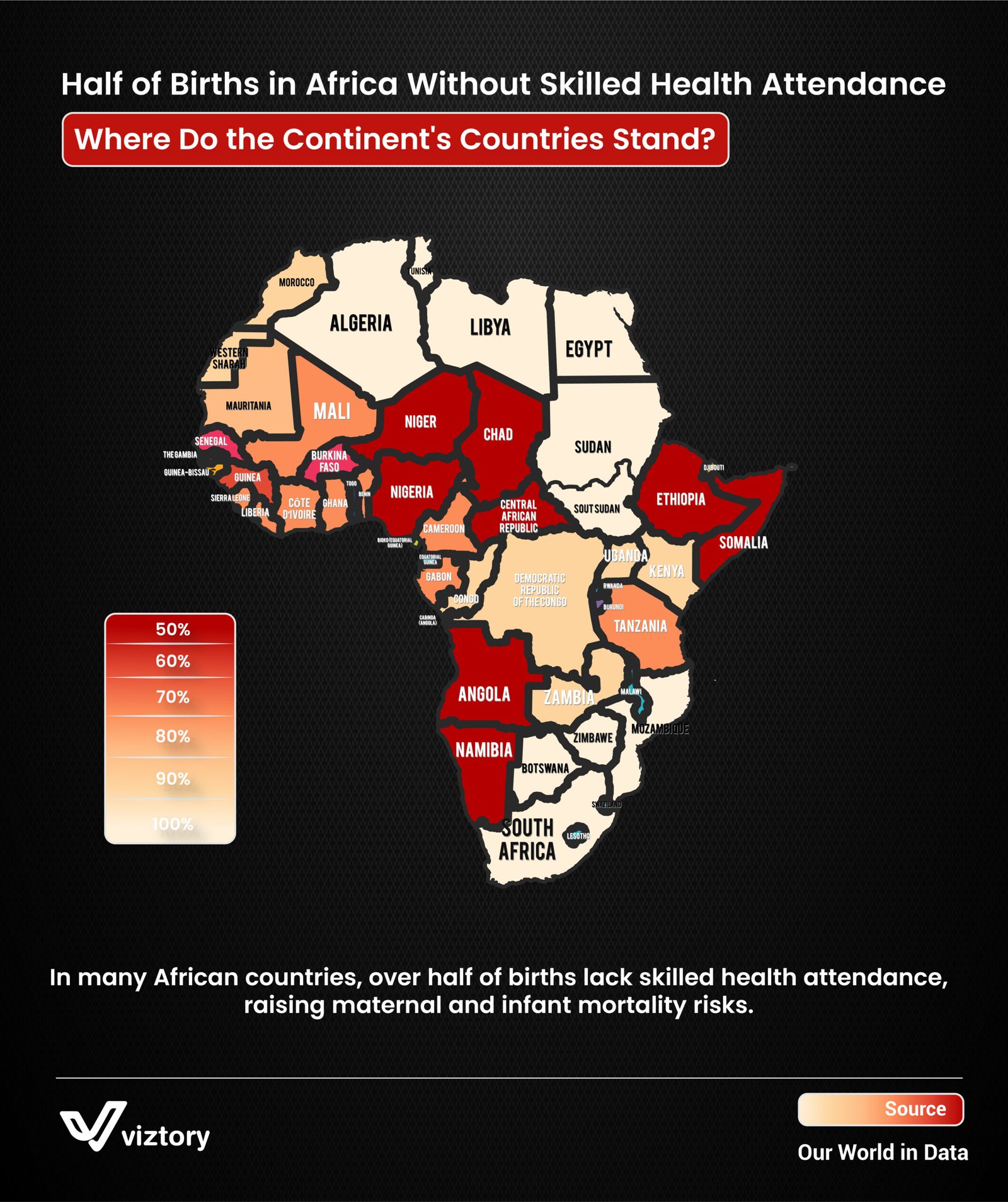Half of Births in Africa Without Skilled Health Attendance
-
Sep, Thu, 2024
Half of Births in Africa Without Skilled Health Attendance: Where Do the Continent’s Countries Stand?
This map highlights a pressing issue in maternal healthcare across Africa: the lack of skilled health attendance during births. In many African countries, over half of births occur without the presence of a trained healthcare professional, contributing to heightened maternal and infant mortality rates. This situation underscores the urgent need to improve healthcare access and quality in the region.
Skilled Health Attendance and Maternal Health
Skilled health attendance is a critical factor in ensuring safe deliveries and reducing the risks associated with childbirth. Health professionals, such as doctors, nurses, and midwives, are trained to manage complications during labor, provide necessary interventions, and ensure both the mother and baby receive appropriate postnatal care. In countries where healthcare systems are weak or access to trained personnel is limited, mothers are left vulnerable to preventable complications that can result in death or long-term health issues.
The map categorizes African countries based on the percentage of births without skilled health attendance, revealing significant disparities across the continent:
-
Countries with the Highest Lack of Attendance: In nations like Niger, Chad, Nigeria, and Somalia, over 90% of births occur without skilled health personnel, placing both mothers and infants at considerable risk.
-
Moderate Attendance: Countries such as Ethiopia, Uganda, and Tanzania also show high numbers of unattended births, with over 60% of births lacking skilled health workers.
-
Improving but Still Concerning: Some countries, such as South Africa, Kenya, and Egypt, demonstrate better access to skilled health attendance, but there remain significant portions of the population who do not have access to this critical care.
Impact on Maternal and Infant Mortality
The lack of skilled healthcare during childbirth is directly correlated with higher maternal and infant mortality rates. According to the World Health Organization (WHO), complications during pregnancy and childbirth are among the leading causes of death for women in low-income countries. Without proper medical care, conditions such as hemorrhage, infections, and obstructed labor often become fatal. Additionally, infants born without access to skilled health professionals are more likely to suffer from birth asphyxia, infections, and complications arising from preterm birth.
The Role of Healthcare Systems in Addressing This Crisis
The map emphasizes the need for stronger healthcare systems across Africa, particularly in rural and underserved areas where access to healthcare professionals is limited. Strengthening maternal health services requires investment in healthcare infrastructure, training more midwives and doctors, and expanding rural healthcare facilities. Additionally, public health education is crucial to inform communities about the importance of skilled health attendance during childbirth.
International organizations and African governments are making efforts to address these gaps. Programs that train local midwives, improve healthcare infrastructure, and increase awareness of maternal health are essential to lowering the maternal mortality rate. However, more substantial and sustained efforts are needed to ensure that no woman has to give birth without skilled medical assistance.
Conclusion
The map illustrates the ongoing challenges many African countries face in providing adequate healthcare during childbirth. With over half of births in many regions lacking skilled health attendance, the continent continues to struggle with high maternal and infant mortality rates. Strengthening healthcare systems, expanding access to medical professionals, and increasing public awareness are key steps toward ensuring that all mothers receive the care they need for a safe delivery. Addressing this issue is not only a matter of healthcare but a fundamental human right that requires immediate attention.

